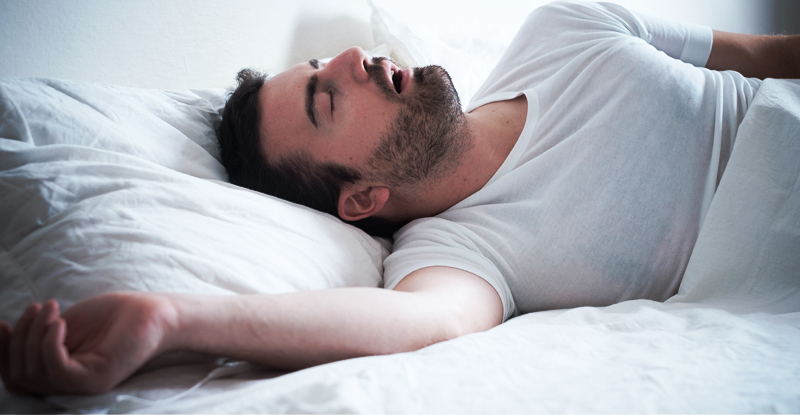Is It Snoring or Sleep Apnea?
Snoring is a common condition and can affect anyone. As many as half of adults in the United States snore. Snoring can occur more often in men, people who are overweight, and older people. Many don’t notice they snore unless someone close to them has drawn attention to it. While snoring can be a real pain for your partner, it could also be a result of a serious health condition.
According to the National Sleep Foundation, 90 million American adults are affected by snoring, and almost 37 million are affected on a nightly basis. Snoring affects both genders, though it affects more men than women. It also becomes more pronounced with advanced age.
Our bodies move into a deep relaxed state while sleeping. A relaxing of the throat can cause our tongues to fall backwards. This may block our airway, narrowing the space and blocking the opening that allows us to continue unrestrained breathing during sleep. This disruption in air flow causes our throat to vibrate, which creates the snoring sound. The more narrow the airway, the louder the noise.
Snoring occurs when a person’s breathing is partially obstructed while sleeping. The blockage causes tissues to vibrate, which produces the loud sound of snoring.
What causes snoring?
There are a number of factors that aggravate snoring. These include:
- Age: Our bodies change every year as we age. Our throats get narrower, and we lose some muscle tone in our throats.
- Sleeping posture: Sleeping on your back can push your tongue to the back of the airway. Lying on your side instead might help alleviate the problem.
- Overweight: Having more fatty tissue and less muscle tone around your neck can cause snoring.
- Alcohol: Drinking alcohol before bed can increase muscle relaxation, which can lead to more snoring.
- Medications: Just as with alcohol, taking muscle relaxants in the evening may cause greater periods of snoring as the throat will be in a more relaxed state.
- Smoking: Smoking can irritate the membranes around your throat and nose, which can cause more blockages of the airway
Snoring isn’t just a concern for adults, either; children can snore as well. If your child snores, pay close attention and consider talking to your doctor. Loud and regular snoring is abnormal in otherwise healthy children. The American Academy of Pediatrics recommends that children who frequently snore get tested for a condition called obstructive sleep apnea.
What is obstructive sleep apnea?
Snoring can be associated with a sleep disorder called obstructive sleep apnea. Obstructive sleep apnea can occur when the muscles in the back of your throat relax too much causing the airways to narrow or close as you breathe in and out. When this happens you may stop breathing or 10 to 20 seconds, causing the levels of oxygen in your blood to lower and levels of carbon dioxide to build up. This pattern can occur for some people up to 30 times an hour. It leads to heavy sleep disruptions and a lack of restful sleep. Don’t worry, though: Your brain is wired to sense impaired breathing and will briefly wake you to reopen the airway. Most people wake so briefly they don’t even notice when it happens.
Risk factors of obstructive sleep apnea
Anyone can develop obstructive sleep apnea. But certain risk factors can increase the likeliness. These include:
- Being overweight or obese
- A family history of the condition
- Hypertension
- Diabetes
- Smoking
- Male gender
- Asthma
Symptoms of obstructive sleep apnea
Snoring is one of the most common signs of obstructive sleep apnea, but look out for other symptoms as well. If your snoring is accompanied by one of the following symptoms, it may point to obstructive sleep apnea.
Symptoms in adults:
- Restless sleep
- Gasping for air or choking at night
- Chest pain at night
- High blood pressure
- Excessive daytime sleepiness
- Morning headaches
- A stop and start in breathing
- Night sweats
- Restlessness during sleep
- Dry mouth or sore throat upon waking
Symptoms in children (may not be as obvious as adults):
- Sweating at night
- Sluggishness and sleepiness
- Bedwetting
- Choking and drooling
- Teeth grinding
- Unusual sleep positions
When to talk to your doctor
Talk to your doctor if you notice any of the symptoms listed above. Remember that there may be explanations for the symptoms other than obstructive sleep apnea. Your doctor will most likely perform a check up and ask you questions about your sleep habits and patterns.
Your doctor may refer you to a sleep specialist or recommend taking part in a sleep study to further evaluate your condition. Some sleep studies require you to spend the night in a sleep lab, but others can be done at home. The goal of these studies is to measure airflow, breathing patterns, electrical activity in the brain, blood oxygen levels, and your heart rate.
Sleep apnea treatment
There are many treatment options available depending on the severity of your obstructive sleep apnea. Your doctor may recommend lifestyle changes like quitting smoking, losing weight, and exercising regularly. If you are a UPMC Health Plan member, call your care manager for more information and ways to get started. If your obstructive sleep apnea is severe, your doctor may recommend other treatments like available therapies, oral devices, or surgery.
Remember, not all snoring is obstructive sleep apnea. But if you’re losing sleep over any of the symptoms listed above, ask your doctor about testing for this condition.
References:
National Sleep Foundation: https://sleepfoundation.org/sleep-disorders-problems/other-sleep-disorders/snoring
American Academy of Otolaryngology–Head and Neck Surgery (AAO-HNS): http://www.entnet.org/content/snoring-and-sleep-apnea
American Academy of Pediatrics: http://pediatrics.aappublications.org/content/pediatrics/109/4/704.full.pdf
Centers for Disease Control and Prevention: https://www.cdc.gov/sleep/index.html
National Heart, Lung, and Blood Institute: https://www.nhlbi.nih.gov/health/health-topics/topics/sleepapnea/
National Institutes of health: https://nihseniorhealth.gov/sleepandaging/snoring/01.html
National Sleep Foundation: https://sleepfoundation.org/sleep-news/snoring-children
UPMC HealthWise: http://www.upmc.com/health-library/Pages/HealthwiseIndex.aspx?qid=hw48243




